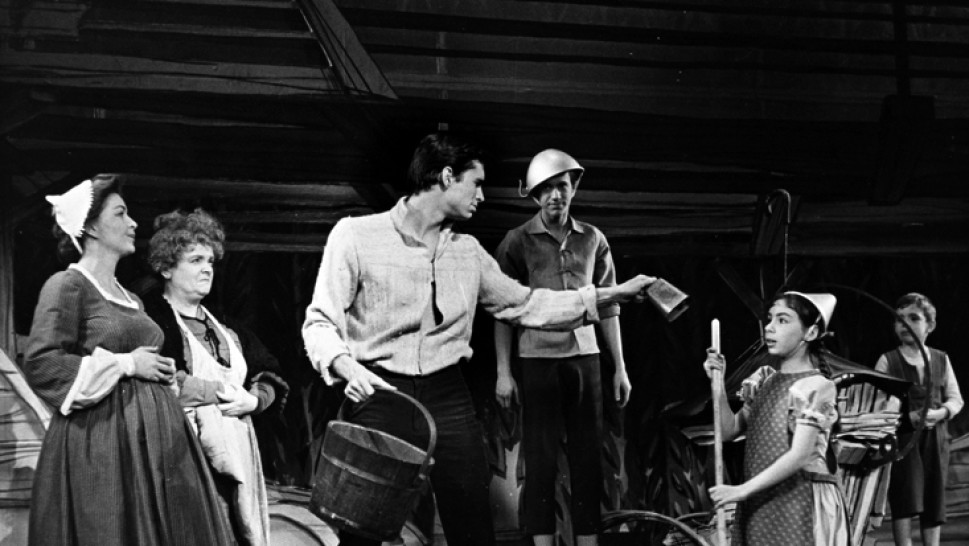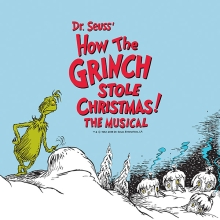Filichia Features: Greenwillow, The Forgotten Frank Loesser Musical

Filichia Features: Greenwillow, The Forgotten Frank Loesser Musical
It happens all the time to those who write for Broadway.
The critics rave about your musical, you have a big hit – but then when you write your next one, the aisle-sitters expect you to top it.
So imagine the pressure on Frank Loesser in 1960. In 1948, his debut musical Where’s Charley? was off to a two-year run and his next one – no less than the Tony-winning Guys and Dolls in 1950 – would run three. Then in 1956, critics cheered the third jewel of Loesser’s triple crown as his masterpiece that shone the brightest: The Most Happy Fella.
As a result, the seven daily New York newspaper critics expected more still from Loesser’s fourth show when his Greenwillow opened on March 8, 1960.
They didn’t get what they came for, mostly because Loesser was trying for something wildly different: a musical about a mystical land where love is amazingly complicated.
Loesser was also working with an untried librettist: Lesser Samuels, who had two Oscar nominations for his contributions to a couple of screenplays in the early ‘50s. And while Lesser and Loesser sounds to be a logical combination, more than one critic wondered “What’s in a name?”
The Tony nominators were far more indulgent. Greenwillow received seven nominations, the best total thus far of any Loesser musical. Doesn’t that septet of honors suggest that this is a musical worth re-examining?
Greenwillow was adapted from a popular 1956 novel of the same name by B.J. Chute. “B.J.” actually stood for Beatrice Joy, but in those days, male authors were taken more seriously. Thus, Beatrice hoped readers would assume that they were reading a book by Benjamin Joseph or Bernard John Chute.
She created a rustic town called Greenwillow. And just where is it? Bragged Chute, “I have been told variously that it is located in such diverse regions as Vermont, Corsica, Denmark and the Kentucky Mountains.” But she insisted that it be “left to the reader’s imagination.”
What we do know is that Greenwillow is the town where Amos Briggs married Martha. No sooner did Amos tie the knot than he unofficially untied it by heading to the hills to live on his own for months. Apparently, Amos doesn’t have trouble in making a commitment, as so many men are now said to have; he just has trouble keeping that commitment.
Oh, every now and then Amos drops in for a visit, and Martha allows him to spend the night. This sometimes results in a pregnancy, so the next time Amos wanders in, he’s introduced to a new son or daughter. The couple now has a half-dozen and counting.
When Chute wrote her novel in the comparatively easy-going ‘50s, a woman was in some corners still expected to be patient, wait for her man and never complain. While of course there were divorces back then, there weren’t as many deadbeat dads, and we didn’t yet know the effects of long-term single-parenting that we do now. A father who leaves his family can no longer be lionized as an adventurer – so any production of Greenwillow must now have the actress portraying Martha playing her as steely and the actor as Amos seem ashamed of his behavior even as his dialogue suggests otherwise.
That’s not the crux of the story, however. Amos and Martha’s oldest is Gideon who worries that the sojourns of the father will be passed onto the son. Although Gideon does have more of a conscience and a grasp of what marriage actually means, he’s concerned that a family curse of wanderlust will trump lust and love after he marries the pretty Dorrie, which he’s inclined to do. But is it right for either one of them?
At least Brooks Atkinson, then in his last year as The New York Times drama critic, wrote “Out of his bountiful music box, Mr. Loesser has provided a warm and varied score that captures the simple mood of the story.”
In those days, a good review from that paper sold a show better than anything else. And yet, Greenwillow was gone after fewer than 100 performances.
But now, 56 years later, considering all we’ve experienced with wayward fathers and single mothers, Greenwillow resonates far more.
Starring as Gideon was Anthony Perkins, not long after his Oscar and Tony nominations respectively for Friendly Persuasion and Look Homeward, Angel. During rehearsals, Perkins had to do double-duty, because he was also filming a movie in Los Angeles, which resulted in many red-eyes to the coast. It was, of course, no less than the classic for which he’s most remembered: Alfred Hitchcock’s Psycho, in which he played Norman Bates, the son with quite the mother fixation.

Anthony Perkins in a scene from Greenwillow (Photo by Friedman-Ables/ The New York Public Library)
Greenwillow did need him, however, on the day the infamous bathtub-murder scene was to be filmed. So that attacker we semi-saw wielding a knife beyond the shower curtain wasn’t Perkins, but a stand-in.
Was it the air in the airplane that gave Perkins the cold he had on the day he recorded the original cast album? When Perkins later listened to his cuts, he was appalled at the way he sounded. Legend has it that after the album was released, he couldn’t walk past a record store without going in to find Greenwillow so that he could buy any and all copies to prevent anyone else from hearing him. All were then given to his agent Helen Merrill for safekeeping. (Now we know why Greenwillow was such a rare, hard-to-find cast album for all those years!)
No, Perkins doesn’t sound bad at all. The worst you can say is that he fits in the era when Rex Harrison’s Henry Higgins ushered in male leads who scored because they could express lyrics without benefit of Beautiful Voices. Perkins is especially potent on the one Greenwillow song that later became famous: “Never Will I Marry,” thanks to Barbra Streisand’s putting it on her third album. Perkins maneuvers the song’s meslimas quite well.
Do you know the word melisma? It sounds like a terrible affliction, doesn’t it? (“Did you hear about Charlie? He went in for a routine checkup -- and they found a melisma! Oh, they took him right in; you don’t fool around with that.”)
But in music, a melisma is a word or syllable that’s stretched over two or more notes. Best example: “Where-air-air-air-air is love?” from Oliver!
Using a melisma has long been considered less-than-desirable songwriting. Loesser rarely did it in any other show, but out of Greenwillow’s 14 songs, he put melismas in 13 of them. Loesser apparently was making a comment on the folksy way the people talk in this rustic part of the world.
The one melisma-less song is “Could’ve Been a Ring,” a charming ditty in which Thomas Clegg, now an elderly man and Gramma Briggs, who’s known him since childhood, muse on how close they came to getting married. They’re two nice parts for the senior members of your company.
There’s also a big role for a cow. For a production at the Utah Festival Opera Company in 1997, an animal-trainer not only offered to get a real live cow but also maintained that he’d be able to teach it to kneel, just as the show demands. Director Vincent Liotta conservatively decided to use puppets for the cow as well as for a pig that also had a cameo. Anyone planning to stage Greenwillow might be wise to follow his lead.
At the beginning of that production, set designer Bill Forrester flew in a rough-hewn wooden oval. As each townsperson entered, he carried with him a miniature of his own home, which he then placed on the oval, making a charming representation of the town. All the while they sang that this glorious morning meant “A Day Borrowed from Heaven.”
During it, however, in came Reverend Lapp. You’ve heard of fire-and-brimstone preachers? This guy dispensed white-hot fire and rock-hard brimstone so unremittingly that audiences caught on early that Greenwillow would be a musical devoid of Lapp dancing. Because he ruined the mood of the townspeople in that opening song, Loesser had them soon switch from a happy-go-lucky major key to a dour-filled minor one.
But wait! Reverend Birdsong recently came to Greenwillow. Now is the town big enough for both of them? For Birdsong is a twinkly-eyed, cute, adorable roly-poly minister who sings “What a blessing to know there’s a devil and that I’m but a pawn in his game, that my impulse to sin doesn’t come from within, and so I’m not exactly to blame.”
Better still is the song that results when both ministers agree to talk on the same subject for “The Sermon” on Sunday: “The Coming of Winter.” Lapp sees only cold, ice and snow while Birdsong envisions featherbeds, blankets and hot toddies. “Rejoice!” Birdsong sings; “Repent!” Lapp demands. They disagree on everything -- even on the pronunciation of “Ah-men” vs. “Ay-men.” When Lapp insists his way is right, Birdsong concedes with a “So be it.”
That’s actually a good inside joke, for the literal translation of “Amen” is indeed “So be it.” And “so be it” that you investigate Greenwillow to see if it’s the right fit for your troupe.
You may e-mail Peter at pfilichia@aol.com. Check out his weekly column each Monday at www.broadwayselect.com and Tuesday at www.masterworksbroadway.com. His book, The Great Parade: Broadway’s Astonishing, Never-To-Be Forgotten 1963-1964 Season is now available at www.amazon.com.

























